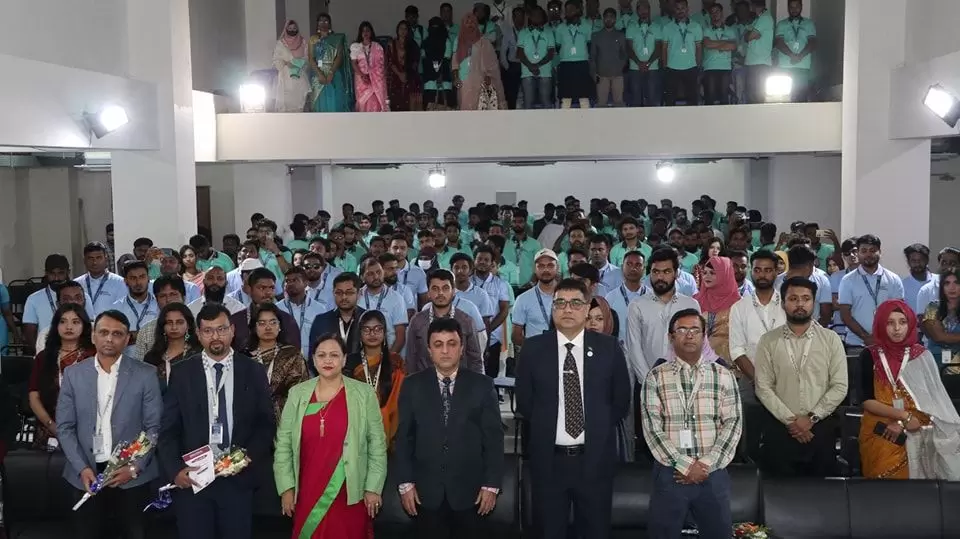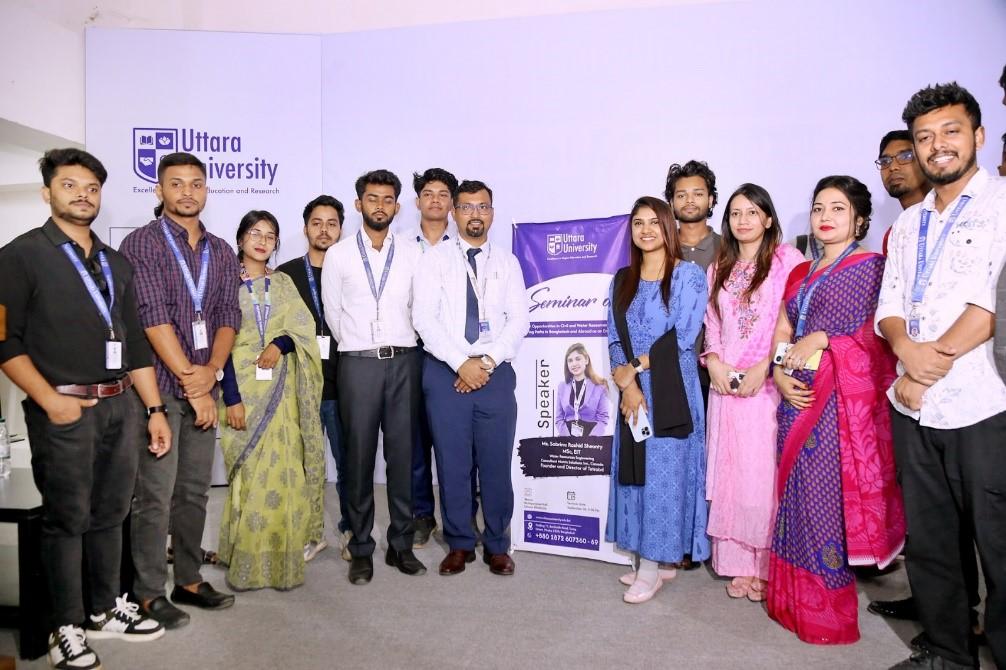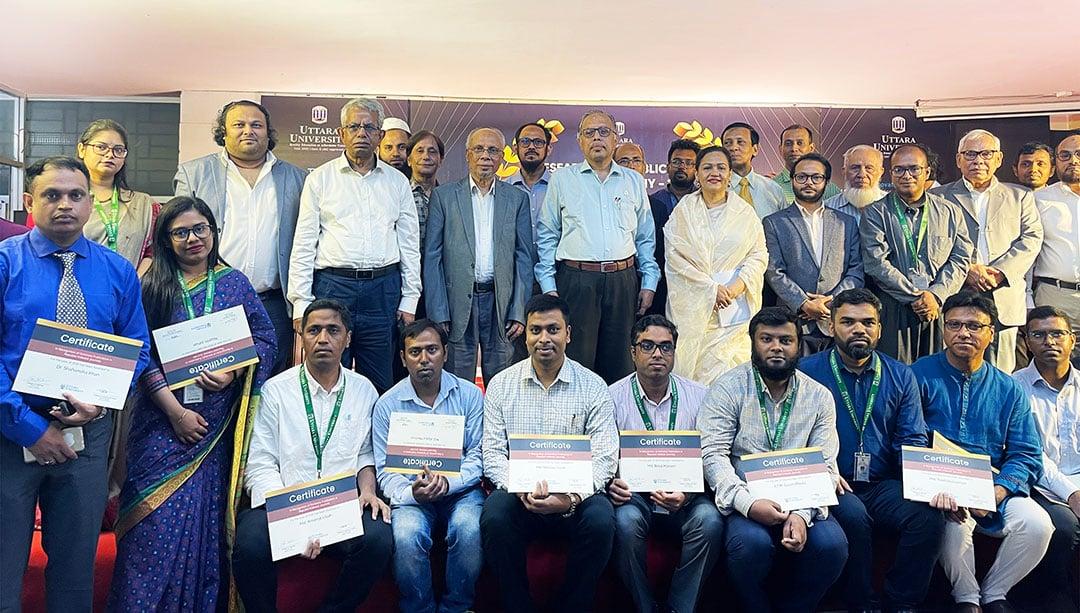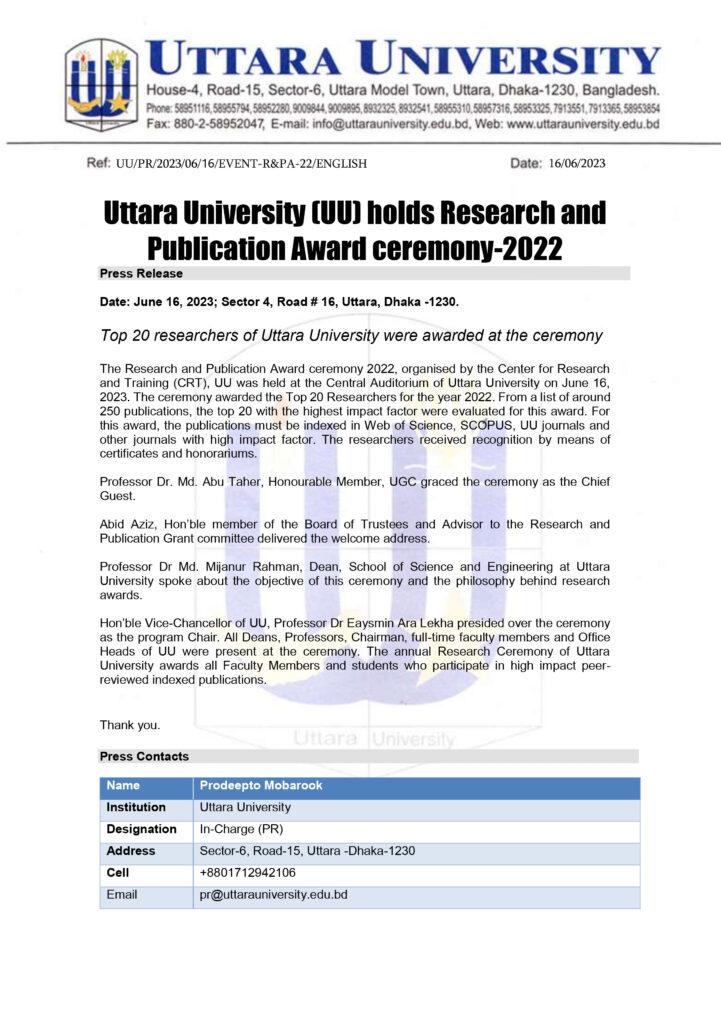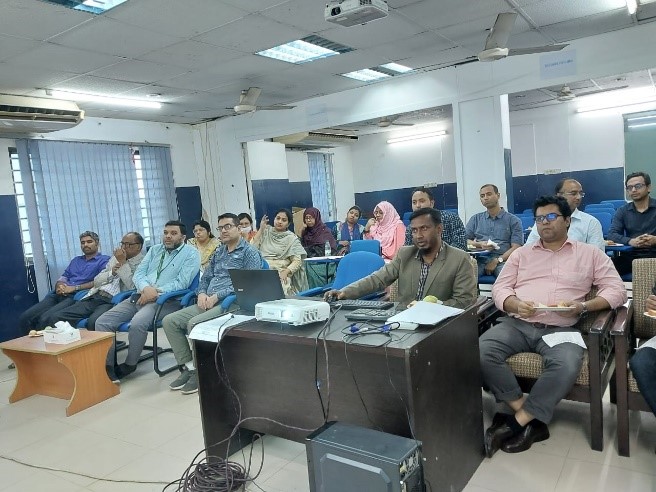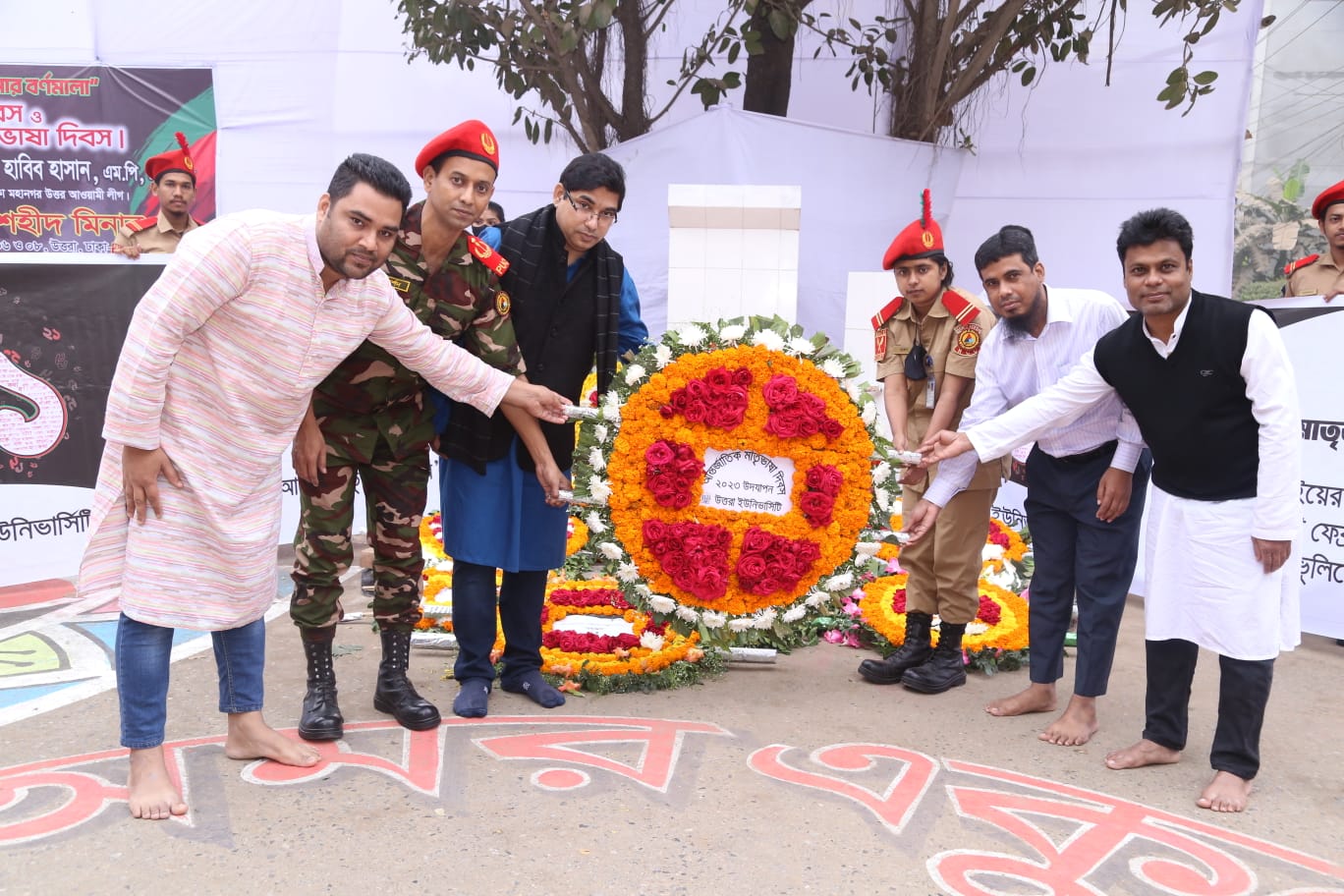Department of Civil Engineering
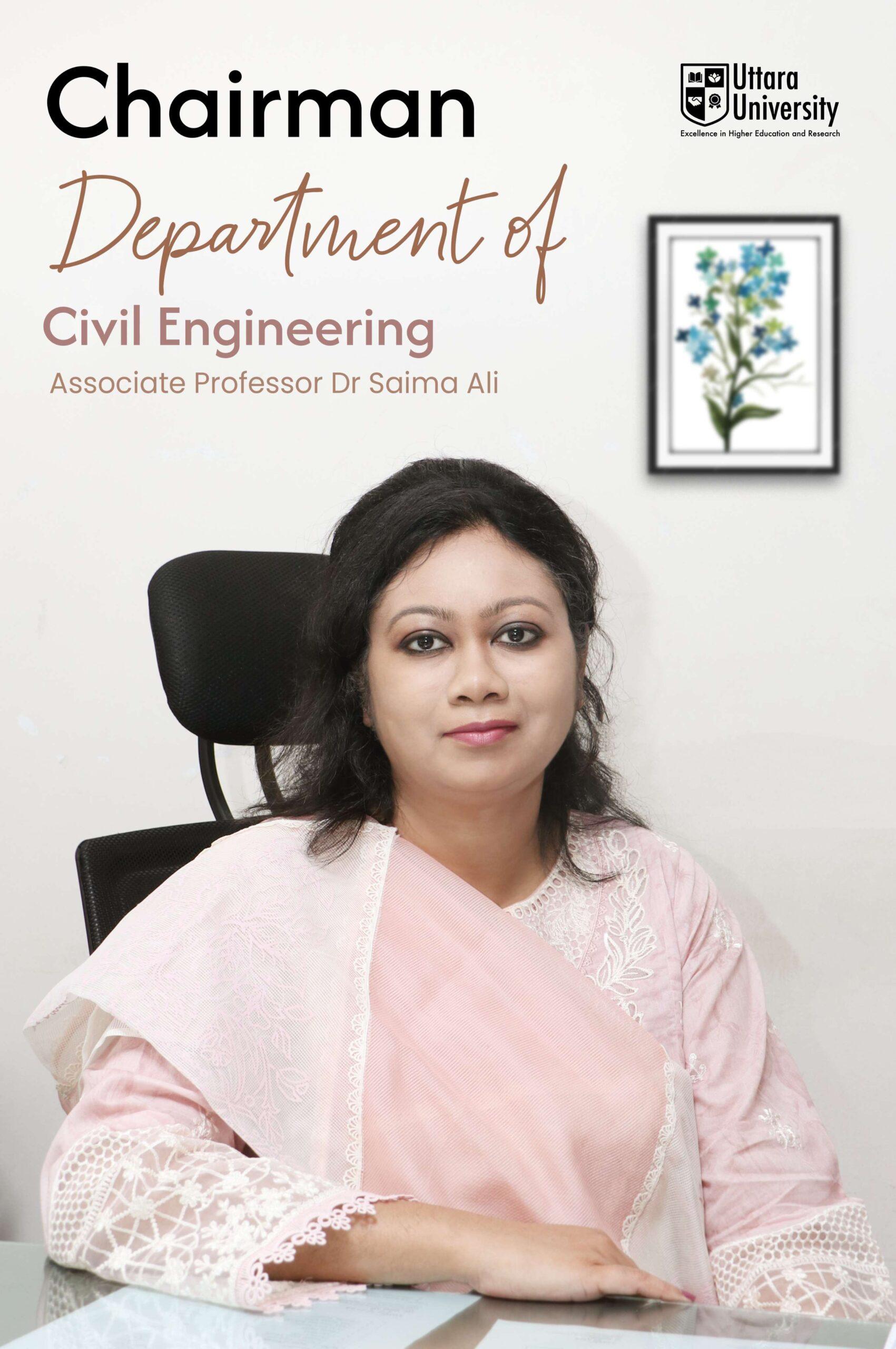
Chairman's Message
Dear Students, Faculty, and Visitors,
Welcome to the Department of Civil Engineering (CE) at Uttara University. As the Chairman of this distinguished department, I am honoured to lead a dedicated team of faculty, researchers, and professionals, all united by their commitment to excellence in civil engineering education and research. Our department believes that equity, diversity, and inclusion (EDI) are integral to achieving excellence in all aspects of our work. Our vision is to create a vibrant and inclusive environment that empowers individuals from all backgrounds to thrive, fosters a sense of belonging, and drives social responsibility in serving diverse communities.
At the CE Department, we are committed to equipping our students to face the challenges of Industry 4.0. To achieve this, we offer an Outcome-Based Education (OBE) curriculum that emphasizes sustainability, resilience, new technology and inclusive development. This program is approved by the University Grants Commission of Bangladesh and follows the requirements of the Accreditation Board for Engineering and Technology (ABET), USA. Therefore, our undergraduate program provides students with a solid foundation in core civil engineering principles, supported by expert academic advising, world-class faculty, innovative learning methods, and a strong focus on career advancement. Our faculty members are distinguished experts in their respective fields, bringing a wealth of experience and expertise to both the classroom and laboratory. Uttara University has carefully selected top-tier faculties, holding Master's or PhD degrees from prestigious international universities. Additionally, our department is well-equipped with state-of-the-art labs, including Structural, Geotechnical, Materials, Water Resources, Environmental, Surveying, Transportation, CAD, and GIS labs.
As we look to the future, the demand for skilled civil engineers will continue to grow, both in Bangladesh and abroad. Whether your career goals are in the public sector, private industry, research institutions, or international development agencies, a degree from the Department of Civil Engineering (CE) will prepare you for success across a broad spectrum of career opportunities.
I encourage you to explore our website to learn more about our programs and join us in shaping the future of civil engineering at Uttara University. Together, let’s build a sustainable and brighter future through the strength of engineering excellence.
Warm regards,
Dr Saima Ali
Associate Professor and Chairman
Department of Civil Engineering
Department Overview
The Department of Civil Engineering at Uttara University, where tradition meets innovation and excellence in education and research, is our guiding principle. Our commitment extends beyond providing quality education to shaping visionary leaders in civil engineering while exposing them to the latest advancements in the field.
With a focus on academic excellence, our department is dedicated to curriculum development, teaching methodologies, scholarly endeavors, and support services. With an offer of a comprehensive undergraduate curriculum based on Outcome-based Education (OBE), our programs include a four-year B.Sc. (Engg.) Program in Civil Engineering and a four-year Diploma in Engineering Degree awarded with concentration/major in (i) Structural Engineering, (ii) Geotechnical Engineering, (iii) Transportation Engineering, (iv) Environmental Engineering, and (v) Water Resources Engineering. Through courses covering topics such as civil engineering fundamentals, structural analysis and design, transportation engineering, and environmental engineering, etc. students gain the knowledge and skills necessary to excel in their careers. With well-equipped labs, experienced instructors, and a focus on practical learning that caters to diverse backgrounds and empowers students to achieve their goals in education and research. Similarly, we are committed to nurturing the moral values and latent potential of our students, preparing them for the job market Our vibrant community maintains teamwork, amity, and mutual support, creating an environment where everyone can thrive. Through collaboration with industry partners and engagement with the broader community, we endeavor to make meaningful contributions to the field of civil engineering and society as a whole. Join us as we pave the way toward a brighter future at Uttara University’s Civil Engineering Department.
With well-equipped labs, experienced instructors, and a focus on practical learning, we cater to diverse backgrounds and empower students to achieve their goals in education and research. Similarly, we are committed to nurturing the moral values and latent potential of our students, preparing them for the job market. Our vibrant community fosters teamwork, amity, and mutual support, creating an environment where everyone can thrive.
Through collaboration with industry partners and engagement with the broader community, we endeavor to make meaningful contributions to the field of civil engineering and society as a whole. Join us as we pave the way toward a brighter future at Uttara University’s Civil Engineering Department.
Vision of the Program Offering Entity
To become a center of excellence that produces civil engineers with professional and leadership qualities, focusing on interdisciplinary and innovative approaches to enrich civil engineering research and practice.
Mission of the Program Offering Entity
- Provide quality education to contribute to the field of Civil Engineering
- Develop soft skills, leadership qualities, and professional ethics among graduates to handle projects independently
- Produce quality graduates who can compete with national and international standards
Objectives of the Program Offering Entity
- The objectives of the department are to develop students' real-life problem-solving abilities, intellectual capacity, teamwork, executive personality, managerial skills, lifelong learning, and entrepreneurial skills in a manner that enables them to become professional leaders in both national and international sustainable development projects
What Experties Do We Build Up?
On completion of the B.Sc. in Civil Engineering program, a graduate will be able to:
- Demonstrate knowledge and critical understanding of the well-established principles of his/her field of study and the way in which those principles have developed
- Apply knowledge and skills in addressing issues and solving problems with minimal supervision
- Evaluate critically the appropriateness of different approaches to solving problems in his/her field of study
- Communicate and interact effectively and clearly with peers, experts, and non-experts in Bangla and English, conveying ideas, information, problems, and solutions as a team
- Demonstrate the ability to incorporate entrepreneurial skills in planning daily activitie
- Exercise a substantial degree of autonomy and often significant responsibility in making judgments or decisions towards the management of self, others, and the allocation of substantial resources
- Demonstrate professional knowledge and practical skills in both technical and management areas to lead a team in an inexperienced environment
- Engage in self-direction and self-enterprise skills
- Demonstrate social, professional, environmental, and ethical practices and values
- Showcase global knowledge and competencies to fulfill employment, entrepreneurial, and lifelong learning skills
- Contribute significantly to society
Medium of Instruction
Uttara University offers all the courses of study primarily in English. Teachers provide instruction to students in the classroom in English. English is also widely used as a medium of communication among the faculties, students, and administrative officials.
Academic Programs
Undergraduate
BSc in Civil Engineering
BSc in Civil Engineering (For Diploma Holder)
Description of the Program
The duration of the program will be four years, divided into eight semesters, for students with an H.S.C in a science background or equivalent or those who have completed A-levels. For students holding a Diploma in Civil Engineering or equivalent technologies, the program will last seven semesters.
The credit hours required for students with an H.S.C in a science background or equivalent, or A-levels, will be at least 160.0 credit hours over four years or eight semesters to be awarded a B.Sc. in Civil Engineering degree. For students with a Diploma in Engineering in Civil or equivalent technologies, at least 143.0 credit hours over seven semesters are required to obtain a B.Sc. in Civil Engineering degree unless otherwise stated. A total of no more than 17.0 credit hours may be exempted from the degree requirement based on the recommendation of the Credit Exemption Committee. This exemption applies to students with a Diploma in engineering background in the following technologies: (i) Civil Technology, (ii) Construction Technology, (iii) Surveying Technology, (iv) Civil and Wood Technology, (v) Wood Technology, (vi) Architecture Technology, (vii) Environmental Technology, and other equivalent technologies whose courses comply with the stated technologies.
The courses are designed to provide a foundation in both civil engineering and other related sciences, enhancing cultural, social, management, and other capacities relevant to the real world. The courses comprise (i) core courses, which are compulsory and represent the nucleus of the program, (ii) prerequisite courses that must be completed before taking other course(s), and (iii) optional/elective courses. Students will have some choice in selecting the required number of courses from a specified group. Students majoring in a concentration area, such as Structural, Geotechnical, Environmental, Transportation, or Water Resources Engineering, will need at least 7.0 additional credit hours and a thesis from the concerned concentration/optional group of interest.
Graduate Attributes
The curriculum divides graduate attributes into three groups, namely, i) Knowledge Profile, ii) Range of Complex Engineering Problem Solving, iii) Range of Complex Engineering Activities. These graduate attributes are shown in Table 1, Table 2 and Table 3 below:
Table 1: Knowledge Profile
| Attributes | |
|---|---|
| K1 | A systematic, theory-based understanding of the natural sciences applicable to the discipline |
| K2 | Conceptually based mathematics, numerical analysis, statistics and the formal aspects of computer and information science to support analysis and modeling applicable to the discipline |
| K3 | A systematic, theory-based formulation of engineering fundamentals required in the engineering discipline |
| K4 | Engineering specialist knowledge that provides theoretical frameworks and bodies of knowledge for the accepted practice areas in the engineering discipline; much is at the forefront of the discipline |
| K5 | Knowledge that supports engineering design in a practice area |
| K6 | Knowledge of engineering practice (technology) in the practice areas in the engineering discipline |
| K7 | Comprehension of the role of engineering in society and identified issues in engineering practice in the discipline: ethics and the engineer’s professional responsibility to public safety; the impacts of engineering activity; economic, social, cultural, environmental and sustainability |
| K8 | Engagement with selected knowledge in the research literature of the discipline |
Table 2: Range of Complex Engineering Problem Solving
| Attributes | |
|---|---|
| Depth of knowledge required | P1: Cannot be resolved without in-depth engineering knowledge at the level of one or more of K3, K4, K5, K6, or K8, which allows a fundamentals-based, first principles analytical approach |
| Range of conflicting requirements | P2: Involve wide-ranging or conflicting technical, engineering, and other issues |
| Depth of analysis required | P3: Have no obvious solution and require abstract thinking, and originality in analysis to formulate suitable models |
| Familiarity of issues | P4: Involve infrequently encountered issues |
| Extent of applicable codes | P5: Are outside problems encompassed by standards and codes of practice for professional engineering |
| Extent of stakeholder involvement and conflicting requirements | P6: Involve diverse groups of stakeholders with widely varying needs |
| Interdependence | P7: Are high level problem high-level many component parts or sub-problems |
Table 3: Range of Complex Engineering Activities
| Attributes | |
|---|---|
| Range of resources | A1: Involve the use of diverse resources (and for this purpose, resources include people, money, equipment, materials, information, and technologies) |
| Level of interaction | A2: Require resolution of significant problems arising from interactions between wide-ranging or conflicting technical, engineering, or other issues |
| Innovation | A3: Involve creative use of engineering principles and research-based knowledge in novel ways |
| Consequences for society and the environment | A4: Have significant consequences in a range of contexts, characterized by difficulty of prediction and mitigation |
| Familiarity | A5: Can extend beyond previous experiences by applying principles-based approaches |
Educational Objectives of the Program
According to the vision and mission of the B.Sc. (Engg.) in Civil Engineering program, the aim of the department is to produce competent graduates who will establish themselves as successful professionals and entrepreneurs. Graduates of the Bachelor of Science in Civil Engineering are expected to acquire and demonstrate the following Program Educational Objectives (PEOs) within three to five years of graduation:
| Attributes | |
|---|---|
| PEO1 | Have a high level of expertise in mathematics, science, and engineering to develop the ability to solve complex engineering problems. |
| PEO2 | Have a sound knowledge base to pursue advanced engineering studies/research for professional development, leading to certifications, professional licenses from recognized bodies, and further educational degrees. |
| PEO3 | Possess strong leadership abilities, effective communication skills, and creativity in planning, designing, and operating civil engineering projects. |
| PEO4 | Practice in civil engineering fields with due consideration for society, the environment, sustainability, and ethical norms. |
Program Learning Outcomes (PLOs)
Program Learning Outcomes (PLOs) of CE 0732 represent the knowledge, skills and attitudes the students should have at the end of a four-year engineering program. According to the accreditation manual (2nd Edition, 2019) of IEB and Board of Accreditation for Engineering and Technical Education (BAETE), Bangladesh, the Civil Engineering (CE) program has the 12 following Program Outcomes:
PLO1: Engineering Knowledge
Apply knowledge of mathematics, natural science, engineering fundamentals, and an engineering specialization, as specified in K1 to K4, respectively, to solve complex engineering problems.
PLO2: Problem Analysis
Identify, formulate, research literature, and analyze complex engineering problems, reaching substantiated conclusions using the first principles of mathematics, natural sciences, and engineering sciences (K1 to K4).
PLO3: Design/Development of Solutions
Design solutions for complex engineering problems and design systems, components or processes that meet specified needs with appropriate consideration for public health and safety, cuas well as ltural, societal, and environmental considerations. (K5)
PLO4: Investigation
Conduct investigations of complex problems using research-based knowledge (K8) and research methods including design, of experiments, analysis and interpretation of data, and synthesis of information to provide valid conclusions.
PLO5: Modern Tool Usage
Create, select and apply appropriate techniques, resources, and modern engineering and IT tools, including prediction and modelling, to complex engineering problems, with an understanding of the limitations. (K6)
PLO6: The Engineer and Society
Apply reasoning informed by contextual knowledge to assess societal, health, safety, legal and cultural issues and the consequent responsibilities relevant to professional engineering practice and solutions to complex engineering problems. (K7)
PLO7: Environment and Sustainability
Understand and evaluate the sustainability and impact of professional engineering work in the solution of complex engineering problems in societal and environmental contexts. (K7)
PLO8: Ethics
Apply ethical principles and commit to professional ethics and responsibilities, and norms of engineering practice. (K7)
PLO9: Individual Work and Teamwork
Function effectively as an individual and as a member or leader in diverse teams and in multi-disciplinary settings.
PLO10: Communication
Communicate effectively on complex engineering activities with the engineering community and with society at large, such as being able to comprehend and write effective reports and design documentation, make effective presentations, and give and receive clear instructions.
PLO11: Project Management and Finance
Demonstrate knowledge and understanding of engineering management principles and economic decision-making and apply these to one’s own work, as a member and leader in a team, to manage projects and in multidisciplinary environments.
PLO12: Life-Long Learning
Recognize the need for and have the preparation and ability to engage in independent and life-long learning in the broadest context of technological change.
Mapping of Departmental Missions with University Missions
| Departmental Missions | University Missions | |||
| Foster and facilitate the advancement of knowledge and make it accessible for all | Prepare competent graduates by imparting quality education, research, and an innovative spirit, along with a cultural mindset and professional and entrepreneurial skills to meet industry requirements | Imbue the University community with ethics and professionalism to render quality services to the local and global societies | ||
| M1 | √ | √ | ||
| M2 | √ | √ | ||
| M3 | √ | |||
Mapping of PEOs with Departmental Mission Statement
| Program Education Objectives (PEOs) | Departmental Mission Statement | |||
| M1 | M2 | M3 | ||
| PEO1 | √ | |||
| PEO2 | √ | |||
| PEO3 | √ | |||
| PEO4 | √ | |||
* PEO - Program Educational Objectives
Mapping PLOs with PEOs
| PLOs | PEO1 | PEO2 | PEO3 | PEO4 |
|---|---|---|---|---|
| PLO1 | √ | √ | ||
| PLO2 | √ | |||
| PLO3 | √ | √ | ||
| PLO4 | √ | √ | ||
| PLO5 | √ | √ | ||
| PLO6 | √ | √ | ||
| PLO7 | √ | |||
| PLO8 | √ | √ | ||
| PLO9 | √ | |||
| PLO10 | √ | |||
| PLO11 | √ | |||
| PLO12 | √ | √ |
| SI. No | Course Code | Course Name | Credit | Program Learning Outcomes | |||||||||||
|---|---|---|---|---|---|---|---|---|---|---|---|---|---|---|---|
| PLO1 | PLO2 | PLO3 | PLO4 | PLO5 | PLO6 | PLO7 | PLO8 | PLO9 | PLO10 | PLO11 | PLO12 | ||||
| 1 | ENG 0231 1101 | English | 3.00 | √ | √ | ||||||||||
| 2 | ENG 0231 1102 | Developing English Language Skills | 1.00 | √ | √ | ||||||||||
| 3 | BAN 0231 1101 | Bengali Language and Literature | 3.00 | √ | √ | ||||||||||
Mapping courses with PLOs
| Title | Details |
|---|---|
| Mapping courses with PLOs | View |
Guideline For Student
Marks Distribution
| Particulars | Marks |
|---|---|
| Class Attendance + Class Performance | 5% |
| Class Test + Assignment | 10% |
| Mid Term Examination | 25% |
| Semester Final Examination | 50% |
| Viva Voce | 10% |
| Total | 100% |
Admission Requirements (Undergraduate)
Structure of the Curriculum
Duration of the Program
Years: 4 (Four)
Semesters: 8 (Eight)
The duration of the program will be four years, divided into 8 semesters for students with an H.S.C. in a science background or equivalent, or who have completed A-levels. The program will last 7 semesters for students with a Diploma in Engineering in Civil or equivalent technologies.
Admission Requirements
In SSC and HSC or equivalent public exams, a student must have a minimum GPA of 2.50, or a 2nd division, or an equivalent grade. If a student obtained a minimum GPA of 2.00 in either of the two exams, then the total GPA must be at least 6.00.
In the O-Level examination, students must have a minimum of five subjects, and in the A-Level examination, they must have at least two subjects. In the aforementioned examinations, a student must have a "B" grade or GPA of 4.00 in four subjects and a "C" grade or GPA of 3.50 in the remaining three subjects.
An admission test will be required for undergraduate programs. The tests will be held in Dhaka as arranged by the University. The written admission tests for the undergraduate program will cover the following subjects:
- English
- Mathematics
- Physics and
- Chemistry
Total Minimum Credit Requirement
The credit hour requirement for students with an H.S.C in a science background or equivalent, or those who have completed A-levels, is at least 160.0 credit hours over four years or eight semesters to award the B.Sc. in Civil Engineering degree.
For students with a Diploma in Engineering in Civil or equivalent technologies, the credit hour requirement is at least 143.0 credit hours over seven semesters to award the B.Sc. in Civil Engineering degree.
A total of 17.0 credit hours are exempted from the degree requirement, which is 160.0 credit hours, for students with a diploma in engineering background in the following technologies: (i) Civil Technology, (ii) Construction Technology, (iii) Surveying Technology, (iv) Civil and Wood Technology, (v) Wood Technology, (vi) Architecture Technology, (vii) Environmental Technology, and other equivalent technologies whose courses comply with the stated technologies.
The following courses are exempted from the minimum credit requirement to achieve the B.Sc. in Civil Engineering degree for students with a diploma in engineering background, as specified in Part A of Art.
| SL NO. | Course Code | Course Title | Credit Hour | Division | Remarks |
|---|---|---|---|---|---|
| 1 | CE 0732 1002 | Civil Engineering Drawing | 1.00 | Basic Engineering | Sessional |
| 2 | CE 0732 1004 | Workshop Sessional | 1.00 | -do- | Sessional |
| 3 | CE 0732 2001 | Surveying | 3.00 | -do- | Theory |
| 4 | CE 0732 2002 | Practical Surveying | 1.00 | -do- | Sessional |
| 5 | CE 0732 2004 | Details of Constructions | 1.00 | -do- | Sessional |
| 6 | CE 0732 2012 | Quantity Surveying | 1.00 | -do- | Sessional |
| 7 | EEE 0613 2101 | Basic Electrical Engineering | 3.00 | Other Engineering | Theory |
| 8 | GED 0411 1101 | Accounting and Economics | 3.00 | General Education | Theory |
| 9 | GED 0312 2103 | Bangladesh Studies | 3.00 | -do- | Theory |
| Total Credit | 17.00 | ||||
Number of Semesters in an Academic Year
There will be two semesters in an academic year. The duration of each semester usually will be six (6) months, which are as follows:
| Semester | Duration |
|---|---|
| Spring | January-June |
| Fall | July-December |
Note: A minimum of 15 weeks of classes must be conducted in each semester.
Total Class Weeks in a Semester
The duration of a semester is six months, including class tests, mid-term, and final examinations. The semester schedule is arranged as follows:
| Theory and Practical Classes | 14 weeks |
| Mid-Term Examination | 2 weeks |
| Semester Final Examination | 3 weeks |
| Total | 19 weeks |
There shall be two examinations: Mid-Term and Semester Final Examinations. The Semester Final Examination will be held at the end of each semester for the completion of the course for that semester.
Minimum CGPA Requirements for Graduation
A student has to earn a minimum Cumulative Grade Point Average (CGPA) of 2.20 out of 4.00 on the basis of courses taken for awarding the B.Sc. in Civil Engineering Degree.
Maximum Academic Years of Completion
A student may get a maximum of 7 academic years to complete his/her degree.
Category of Courses
General Education Courses (Credit =7+15+11+12+8=53)
| Course Code (Course Title) | Credit Hours | Contact Hours | |
|---|---|---|---|
| Language (Credit: 7.00) | ENG 0231 1101 (English) | 3.00 | 3.00 |
| BAN 0231 1101 (Bengali Language and Literature) | 3.00 | 3.00 | |
| ENG 0231 1102 (Developing English Language Skills) | 1.00 | 3.00 | |
| Social Science, Arts, Humanities, and Business (Credit: 15.00) | GED 0411 1101 (Accounting and Economics) | 3.00 | 3.00 |
| GED 0222 2101 (History of the Emergence of Bangladesh) | 3.00 | 3.00 | |
| GED 0312 2103 (Bangladesh Studies) | 3.00 | 3.00 | |
| GED 0311 4101 (Socio-economic Aspects of Development Project) | 3.00 | 3.00 | |
| GED 0411 4103 (Entrepreneurship and Business Management) | 3.00 | 3.00 | |
| Basic Science (Physics and Chemistry) (Credit: 11.00) | PHY 0533 1101 (Physics I) | 3.00 | 3.00 |
| CHE 0531 1101 (Chemistry) | 3.00 | 3.00 | |
| CHE 0531 1102 (Chemistry Sessional) | 1.00 | 3.00 | |
| PHY 0533 1102 (Physics Sessional) | 1.00 | 3.00 | |
| PHY 0533 1103 (Physics II) | 3.00 | 3.00 | |
| Mathematics (Credit: 12.00) | MAT 0541 1101 (Mathematics I) | 3.00 | 3.00 |
| MAT 0541 1103 (Mathematics II) | 3.00 | 3.00 | |
| MAT 0541 2101 (Mathematics III) | 3.00 | 3.00 | |
| MAT 0541 2103 (Applied Mathematics for Engineers) | 3.00 | 3.00 | |
| Other Engineering (CSE and EEE) (Credit: 8.00) | CSE 0613 2101 (Numerical Methods and Computer Programming) | 3.00 | 3.00 |
| CSE 0613 2102 (Computer Programming Sessional) | 1.00 | 3.00 | |
| EEE 0613 2101 (Basic Electrical Engineering) | 3.00 | 3.00 | |
| CSE 0613 4102 (Engineering Computation Sessional) | 1.00 | 3.00 | |
| Total Credits | 53.00 | 63.00 | |
Core Courses (Credit =30+7+18+8+8+8+10=89)
| Course Code (Course Title) | Credit Hours | Contact Hours | |
|---|---|---|---|
| Basic Engineering (Credit: 30.00) | CE 0732 1001 (Analytic Mechanics) | 3.00 | 3.00 |
| CE 0732 1002 (Civil Engineering Drawing) | 1.00 | 3.00 | |
| CE 0732 1003 (Engineering Materials) | 3.00 | 3.00 | |
| CE 0732 1004 (Workshop Sessional) | 1.00 | 3.00 | |
| CE 0732 1006 (Engineering Materials Sessional) | 1.00 | 3.00 | |
| CE 0732 2001 (Surveying) | 3.00 | 3.00 | |
| CE 0732 2002 (Practical Surveying) | 1.00 | 3.00 | |
| CE 0732 2003 (Mechanics of Solids I) | 3.00 | 3.00 | |
| CE 0732 2004 (Details of Constructions) | 1.00 | 3.00 | |
| CE 0732 2005 (Engineering Geology and Geomorphology) | 3.00 | 3.00 | |
| CE 0732 2006 (Mechanics of Solids Sessional) | 1.00 | 3.00 | |
| CE 0732 2007 (Mechanics of Solids II) | 3.00 | 3.00 | |
| CE 0732 2008 (Computer Aided Drafting) | 1.00 | 3.00 | |
| CE 0732 2009 (Fluid Mechanics) | 3.00 | 3.00 | |
| CE 0732 2010 (Fluid Mechanics Sessional) | 1.00 | 3.00 | |
| CE 0732 2012 (Quantity Surveying) | 1.00 | 3.00 | |
| Civil Engineering Practice (Credit: 7.00) | CE 0732 4001 (Project Planning and Construction Management) | 3.00 | 3.00 |
| CE 0732 4002 (Professional Practices and Communication Sessional) | 1.00 | 3.00 | |
| CE 0732 4003 (Professional Ethics) | 3.00 | 3.00 | |
| Structural Engineering (Credit: 18.00) | CE 0732 3101 (Structural Analysis and Design I) | 3.00 | 3.00 |
| CE 0732 3103 (Design of Concrete Structures I) | 3.00 | 3.00 | |
| CE 0732 3104 (Concrete Structures Design Sessional I) | 1.00 | 3.00 | |
| CE 0732 3105 (Structural Analysis and Design II) | 3.00 | 3.00 | |
| CE 0732 3107 (Design of Concrete Structures II) | 3.00 | 3.00 | |
| CE 0732 4101 (Design of Steel Structures) | 3.00 | 3.00 | |
| CE 0732 4102 (Steel Structures Design Sessional) | 1.00 | 3.00 | |
| CE 0732 4104 (Concrete Structures Design Sessional II) | 1.00 | 3.00 | |
| Geotechnical Engineering (Credit: 8.00) | CE 0732 3201 (Geotechnical Engineering I) | 3.00 | 3.00 |
| CE 0732 3202 (Geotechnical Engineering Sessional I) | 1.00 | 3.00 | |
| CE 0732 3203 (Geotechnical Engineering II) | 3.00 | 3.00 | |
| CE 0732 3204 (Geotechnical Engineering Sessional II) | 1.00 | 3.00 | |
| Transportation Engineering (Credit: 8.00) | CE 0732 3301 (Transportation Engineering I) | 3.00 | 3.00 |
| CE 0732 3302 (Transportation Engineering Sessional I) | 1.00 | 3.00 | |
| CE 0732 3303 (Transportation Engineering II) | 3.00 | 3.00 | |
| CE 0732 3304 (Transportation Engineering Sessional II) | 1.00 | 3.00 | |
| Environmental Engineering (Credit: 8.00) | CE 0732 3401 (Environmental Engineering I) | 3.00 | 3.00 |
| CE 0732 3403 (Environmental Engineering II) | 4.00 | 4.00 | |
| CE 0732 3404 (Environmental Engineering Sessional) | 1.00 | 3.00 | |
| Water Resources Engineering (Credit: 10.00) | CE 0732 3501 (Hydrology) | 3.00 | 3.00 |
| CE 0732 4501 (Open Channel Flow) | 3.00 | 3.00 | |
| CE 0732 4502 (Open Channel Flow Sessional) | 1.00 | 3.00 | |
| CE 0732 4503 (Irrigation and Flood Control) | 3.00 | 3.00 | |
| Total | 89.00 | 127.00 | |
Technical Elective Courses (Credit = 3+16+10+10+13+7 = 59)
| Course Code (Course Title) | Credit Hours | Contact Hours | |
|---|---|---|---|
| Language (Credit: 7.00) | ENG 0231 1101 (English) | 3.00 | 3.00 |
| BAN 0231 1101 (Bengali Language and Literature) | 3.00 | 3.00 | |
| ENG 0231 1102 (Developing English Language Skills) | 1.00 | 3.00 | |
| Social Science, Arts, Humanities, and Business (Credit: 15.00) | GED 0411 1101 (Accounting and Economics) | 3.00 | 3.00 |
| GED 0222 2101 (History of the Emergence of Bangladesh) | 3.00 | 3.00 | |
| GED 0312 2103 (Bangladesh Studies) | 3.00 | 3.00 | |
| GED 0311 4101 (Socio-economic Aspects of Development Project) | 3.00 | 3.00 | |
| GED 0411 4103 (Entrepreneurship and Business Management) | 3.00 | 3.00 | |
| Basic Science (Physics and Chemistry) (Credit: 11.00) | PHY 0533 1101 (Physics I) | 3.00 | 3.00 |
| CHE 0531 1101 (Chemistry) | 3.00 | 3.00 | |
| CHE 0531 1102 (Chemistry Sessional) | 1.00 | 3.00 | |
| PHY 0533 1102 (Physics Sessional) | 1.00 | 3.00 | |
| PHY 0533 1103 (Physics II) | 3.00 | 3.00 | |
| Mathematics (Credit: 12.00) | MAT 0541 1101 (Mathematics I) | 3.00 | 3.00 |
| MAT 0541 1103 (Mathematics II) | 3.00 | 3.00 | |
| MAT 0541 2101 (Mathematics III) | 3.00 | 3.00 | |
| MAT 0541 2103 (Applied Mathematics for Engineers) | 3.00 | 3.00 | |
| Other Engineering (CSE and EEE) (Credit: 8.00) | CSE 0613 2101 (Numerical Methods and Computer Programming) | 3.00 | 3.00 |
| CSE 0613 2102 (Computer Programming Sessional) | 1.00 | 3.00 | |
| EEE 0613 2101 (Basic Electrical Engineering) | 3.00 | 3.00 | |
| CSE 0613 4102 (Engineering Computation Sessional) | 1.00 | 3.00 | |
| Civil Engineering Practice (Credit: 3.00) | CE 0732 4005 (Business and Career Development) | 3.00 | 3.00 |
| Structural Engineering (Credit: 16.00) | CE 0732 4103 (Design of Concrete Structures III) | 3.00 | 3.00 |
| CE 0732 4105 (Prestressed Concrete) | 3.00 | 3.00 | |
| CE 0732 4107 (Finite Element Method) | 3.00 | 3.00 | |
| CE 0732 4108 (Computer Aided Analysis and Design of Structures Sessional) | 1.00 | 3.00 | |
| CE 0732 4109 (Theory of Elasticity) | 3.00 | 3.00 | |
| CE 0732 4111 (Dynamics of Structures) | 3.00 | 3.00 | |
| Geotechnical Engineering (Credit: 10.00) | CE 0732 4201 (Soil-Water Interaction) | 3.00 | 3.00 |
| CE 0732 4202 (Geotechnical Engineering Design Sessional) | 1.00 | 3.00 | |
| CE 0732 4203 (Earth Retaining Structures) | 3.00 | 3.00 | |
| CE 0732 4205 (Elementary Soil Dynamics) | 3.00 | 3.00 | |
| Transportation Engineering (Credit: 10.00) | CE 0732 4301 (Transportation Engineering III) | 3.00 | 3.00 |
| CE 0732 4302 (Transportation Engineering Sessional III) | 1.00 | 3.00 | |
| CE 0732 4303 (Transportation Engineering IV) | 3.00 | 3.00 | |
| CE 0732 4305 (Transportation Engineering V) | 3.00 | 3.00 | |
| Environmental Engineering (Credit: 13.00) | CE 0732 4401 (Environmental Impact Assessment) | 3.00 | 3.00 |
| CE 0732 4403 (Environmental Pollution Management and Control) | 3.00 | 3.00 | |
| CE 0732 4405 (Risks and Disaster Management) | 3.00 | 3.00 | |
| CE 0732 4406 (Design of Water Supply, Sanitation & Sewage System Sessional) | 1.00 | 3.00 | |
| CE 0732 4407 (Solid Waste Management) | 3.00 | 3.00 | |
| Water Resources Engineering (Credit: 7.00) | CE 0732 4504 (Water Resources Engineering Sessional) | 1.00 | 3.00 |
| CE 0732 4505 (Water Resources Planning and Management) | 3.00 | 3.00 | |
| CE 0732 4507 (Groundwater Engineering) | 3.00 | 3.00 | |
| Total | 59.00 | 69.00 | |
Technical Elective Courses (Credit = 3+16+10+10+13+7 = 59)
| Course Code (Course Title) | Credit Hours | Contact Hours | |
|---|---|---|---|
| Capstone/Internship/Thesis/Projects (Credit: 7.00) | CE 0732 3000 (Industrial Training) | 0.00 | 3 weeks |
| CE 0732 4000 (Project & Thesis) | 3.00 | 6.00 | |
| CE 0732 4004 (Final Year Design Project) | 3.00 | 6.00 | |
| Total | 7.00 | 12.00 | |
Course Designation and Numbering System
Each course is designated by a code that includes the following structure:
- All course numbers will have 8 digits
- The course number for departmental courses will begin with "CE," followed by an 8-digit number
- The course number for mathematics-related courses will begin with "MAT," followed by an 8-digit number
- The course number for English language-related courses will begin with "ENG," followed by an 8-digit number
- The course number for Bangla language-related courses will begin with "BAN," followed by an 8-digit number
- The course number for physics-related courses will begin with "PHY," followed by an 8-digit number
- The course number for chemistry-related courses will begin with "CHE," followed by an 8-digit number
- The course number for general education-related courses will begin with "GED," followed by an 8-digit number
- The course number for electrical engineering-related courses will begin with "EEE," followed by an 8-digit number
- Description of digits:
- 1st four digits: Subject code according to BNQF (detailed field)
- 5th digit: Year
- 6th digit: Civil Engineering Division/Branch
- 7th and 8th digits: Course number (01 to 99: Odd numbers will indicate theoretical courses, and even numbers will indicate sessional/lab/practical courses)
Division/Branch-Wise Number Allocation
- Basic Engineering and Civil Engineering Practice: 0
- Structural Engineering: 1
- Geotechnical Engineering: 2
- Transportation Engineering: 3
- Environmental Engineering: 4
- Water resources engineering: 5
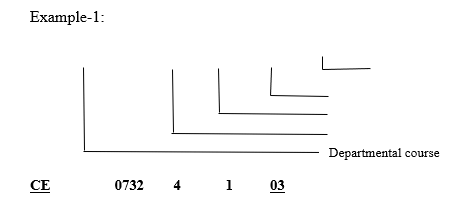
- Course offered in fourth year
- Course (theoretical) number 3 of structural engineering division 1 for Structural engineering division
- Detailed field for civil engineering according to BNQF
Example-2: CE 0732 3002
Here, CE🡪Departmental course, 0732🡪 Detailed field for civil engineering according to BNQF, 3🡪Course offered at 3rd year, 0🡪 Division: Basic Engineering, 02🡪Course no. 2 of Basic Engineering which is usually sessional course.
Note: : In the case of departmental non-engineering or other engineering courses, the second digit (odd number) will be "1," indicating civil engineering.
Year/Semester wise Course Distribution
| Title | Details |
|---|---|
| Semester wise distribution of courses | View |
Adviser List
| Title | Details |
|---|---|
| List of Department Adviser | View |
Department Of Civil Engineering Co-Curricular Club List
-
Uttara University Civil Engineering Society (UUCES)
- Moderator: Md Zakaria Habib
- Associate Moderator: Tasnova Chowdhury
Uttara University Civil Engineering Society (UUCES)
This club organizes a variety of events, including cultural events, study tours, workshops, and symposiums within the department aimed at alleviating the monotony of students’ studies. These activities offer opportunities for students to engage in diverse experiences, broaden their horizons, and connect with peers outside of their academic routines. By participating in these events, students can explore new interests, develop social networks, and enrich their overall academic journey. Ultimately, the motif is to nourish a vibrant and dynamic campus community where students can thrive both academically and personally.
Curriculum & Syllabus Committee
| SL No. | Role | Name |
|---|---|---|
| 1 | Convener | Dr. Md. Sultanul Islam, Associate Professor and Dean, Dept. of Civil Engineering |
| 2 | External Members | Dr. Md. Akramul Alam (Professor, Dept. of Civil Engineering, DUET) |
| 3 | Dr. Md. Abdus Salam (Professor, Dept. of Civil Engineering, DUET) | |
| 4 | Members | Md. Ashraful Alam (Assistant Professor & Coordinator, Dept. of Civil Engineering) |
| 5 | Md. Monuar Hossain (Assistant Professor, Dept. of Civil Engineering) | |
| 6 | Abul Monsur Mohammed Musa (Assistant Professor, Dept. of Civil Engineering) | |
| 7 | Md. Tarequl Islam (Lecturer, Dept. of Civil Engineering) | |
| 8 | Member Secretary | Md. Zakaria Habib (Assistant Professor, Dept. of Civil Engineering) |
Admission and Promotional Committee
| SL No. | Role | Name |
|---|---|---|
| 1 | Convener | Abul Monsur Mohammed Musa (Assistant Professor, Dept. of Civil Engineering) |
| 2 | Member | Tasnuva Chowdhury (Lecturer, Dept. of Civil Engineering) |
| 3 | Sourav Malakar (Lecturer, Dept. of Civil Engineering) | |
| 4 | Labiba Jannat Noushin (Lecturer, Dept. of Civil Engineering) | |
| 5 | Member Secretary | Md. Tarequl Islam (Lecturer, Dept. of Civil Engineering) |
Examination Committee
| SL No. | Role | Name |
|---|---|---|
| 1 | Convener | Md. Monuar Hossain (Assistant Professor, Dept. of Civil Engineering) |
| 2 | Member | Md. Tarequl Islam (Lecturer, Dept. of Civil Engineering) |
| 3 | Tasnuva Chowdhury (Lecturer, Dept. of Civil Engineering) | |
| 4 | Mst. Sathi Akter (Lecturer, Dept. of Civil Engineering) | |
| 5 | Suponna Malek Tuntun (Lecturer, Dept. of Civil Engineering) | |
| 6 | Nusaiba Binte Saif (Lecturer, Dept. of Civil Engineering) | |
| 7 | Akib Mahmud (Lecturer, Dept. of Civil Engineering) | |
| 8 | Pretom Md. Tahmidur Rahman (Lecturer, Dept. of Civil Engineering) | |
| 9 | Joy Majumder (Lecturer, Dept. of Civil Engineering) | |
| 10 | Talha Jubair (Lecturer, Dept. of Civil Engineering) | |
| 11 | Shovon Chakravarty (Lecturer, Dept. of Civil Engineering) | |
| 12 | Shamim Al Mamun (Lecturer, Dept. of Civil Engineering) | |
| 13 | Anika Sikder (Lecturer, Dept. of Civil Engineering) | |
| 14 | Lamia Islam Leeya (Lecturer, Dept. of Civil Engineering) | |
| 15 | Member Secretary | Tofayel Ahmed Tapu (Lecturer & Coordinator, Dept. of Civil Engineering) |
Question Moderation Committee
| SL No. | Role | Name |
|---|---|---|
| 1 | Convener | Dr. Md. Sultanul Islam, Associate Professor and Dean, Dept. of Civil Engineering |
| 2 | Member | Md. Zakaria Habib (Assistant Professor, Dept. of Civil Engineering) |
| 3 | Sourav Malakar (Lecturer, Dept. of Civil Engineering) | |
| 4 | Tofayel Ahmed Tapu (Lecturer & Coordinator, Dept. of Civil Engineering) | |
| 5 | Aseaya Khanom Mim (Lecturer, Dept. of Civil Engineering) | |
| 6 | Sourav Malakar (Lecturer, Dept. of Civil Engineering) | |
| 7 | Member Secretary | Md. Ashraful Alam (Assistant Professor & Coordinator, Dept. of Civil Engineering) |
Lab Supervision Committee
| SL No. | Role | Name |
|---|---|---|
| 1 | Convener | Md. Tarequl Islam (Lecturer, Dept. of Civil Engineering) |
| 2 | Member | Md. Monuar Hossain (Assistant Professor, Dept. of Civil Engineering) |
| 3 | Abul Monsur Mohammed Musa (Assistant Professor, Dept. of Civil Engineering) | |
| 4 | Tofayel Ahmed Tapu (Lecturer & Coordinator, Dept. of Civil Engineering) | |
| 5 | Aseaya Khanom Mim (Lecturer, Dept. of Civil Engineering) | |
| 6 | Tasnuva Chowdhury (Lecturer, Dept. of Civil Engineering) | |
| 7 | Sourav Malakar (Lecturer, Dept. of Civil Engineering) | |
| 8 | Suponna Malek Tuntun (Lecturer, Dept. of Civil Engineering) | |
| 9 | Akib Mahmud (Lecturer, Dept. of Civil Engineering) | |
| 10 | Member Secretary | Pretom Md. Tahmidur Rahman (Lecturer, Dept. of Civil Engineering) |
Project/Thesis Evaluation Committee
| SL No. | Role | Name |
|---|---|---|
| 1 | Convener | Dr. Md. Sultanul Islam, Associate Professor and Dean, Dept. of Civil Engineering |
| 2 | Member | Md. Ashraful Alam (Assistant Professor & Coordinator, Dept. of Civil Engineering) |
| 3 | Md. Zakaria Habib (Assistant Professor, Dept. of Civil Engineering) | |
| 4 | Member Secretary | Aseaya Khanom Mim (Lecturer, Dept. of Civil Engineering) |
Disciplinary Committee
| SL No. | Role | Name |
|---|---|---|
| 1 | Convener | Dr. Md. Sultanul Islam, Associate Professor and Dean, Dept. of Civil Engineering |
| 2 | Member | Md. Ashraful Alam (Assistant Professor & Coordinator, Dept. of Civil Engineering) |
| 3 | Md. Zakaria Habib (Assistant Professor, Dept. of Civil Engineering) | |
| 4 | Md. Monuar Hossain (Assistant Professor, Dept. of Civil Engineering) | |
| 5 | Member Secretary | Abul Monsur Mohammed Musa (Assistant Professor, Dept. of Civil Engineering) |
Research Areas
Dr. Md. Sultanul Islam
- Environmental Engineering
- River and Lake Water Quality
- Solid waste management
Md. Ashraful Alam
- Structural Engineering
Md. Zakaria Habib
- Concrete
- Geopolymer
- Bond
- Strengthening
- Confinement, etc
Md. Monuar Hossain
- Fluid Dynamics
- Differential Equation
Md. Tarequl Islam
- Water quality
- GIS
- Machine Learning
- Wastewater treatment
Tofayel ahmed Tapu
- Intelligent transportation systems
- Connected and autonomous vehicle
- Transportation network modelling
- Traffic simulation
- Traffic signal control
- Transportation planning
- Traffic safety
- Accident analysis
Resources
To Access a comprehensive repository of departmental resources through a centralized link:
| Title | Details |
|---|---|
| All materials required for Civil Engineering (UU) in one platform | View |
Lab Facilities
1. Surveying Laboratory
Focuses on determining direct or indirect measurements to ascertain the relative positions of various features on, above, or below the earth's surface and then portraying those positions on a map to depict them in a usable form.
2. Environmental Engineering Laboratory
This sessional mainly deals with the determination of physico-chemical and bacteriological properties of water. It will also aid in determining optimum dosing for common physicochemical treatments. The manual contains relevant fundamental chemistry and biology concepts and theories, along with their applications in environmental engineering. The key tests include physical, chemical, and bacteriological tests of water and wastewater. Sampling methods and laboratory analysis of air and solid waste are also discussed in this sessional.
3. Multipurpose Laboratory
Civil Engineering Drawing lab familiarizes students with the use of engineering drawing concepts and tools for preparing technical drawings.
4. Workshop Laboratory
Covers carpentry, machine, and welding-related works that are required to supervise the construction of wood and steel structures, including basic carpentry tasks, lathe machine operation, and basic welding works.
5. Strength of Material Laboratory
Conduct various tests to evaluate the mechanical properties and the behavior of different materials, including direct shear, buckling, compression, tension and torsion tests, aiding in structural analysis and design.
6. Water Resource Engineering Laboratory
Hydrologic Cycle: Scope and application of the hydrologic cycle; catchment characteristics. Precipitation: Measurement of precipitation; gauge networks; preparation of rainfall data; presentation of rainfall data; averaging depth of rainfall; analysis of rainfall data. Hydrologic Abstraction: Interception and depression storage; evaporation; evapotranspiration; infiltration; infiltration indices.
Ground Water: Occurrence and distribution of groundwater; specific yield of aquifers; movement of groundwater; Darcy’s law; safe yield of a basin; steady flow in a well for confined and unconfined aquifers; well losses and specific capacity of a well. Runoff: Runoff process; factors affecting runoff; rainfall-runoff relationship; stream gauging; stage-discharge relation; selection of site for stream gauging. Hydrographs of Runoff: Components of hydrograph; hydrograph separation; unit hydrographs; synthetic hydrographs.
Design Flood: Methods of determining design flood; frequency analysis. Hydrologic Routing: Reservoir routing; stream flow routing; modeling; simulation of flow.
7. Engineering Materials/Concrete Laboratory
General discussion on preparation and properties of concrete, test for specific gravity, unit weight, voids and bulking of aggregates; moisture content and absorption of coarse and fine aggregates; gradation of coarse and fine aggregates; sampling and testing of bricks for absorption, unit weight, efflorescence and compressive strength; normal consistency, initial setting time, soundness and fineness test of cement; tensile and compressive strengths of cement mortar; tests on fresh and hardened concrete.
8. Transportation Engineering Laboratory
Students learn about the properties of pavement materials, asphalt mix design, and testing methods through hands-on experiments and research.
9. Geotechnical Engineering Laboratory
Enable students to find the different properties of soils through laboratory tests, which are required to understand the behavior of soil. The tests include field identification tests, grain size analysis by sieve and hydrometer, specific gravity test, Atterberg limits test, permeability tests (constant head and variable head), field density test, relative density test, and Proctor compaction tests.
10. Geotechnical Engineering Laboratory II
Sharpen algorithmic problem-solving skills through competitive programming challenges, fostering quick thinking and efficient coding practices.
11. Chemistry Laboratory
Helps students learn how to apply theoretical concepts practically to develop their practical knowledge. It exposes them to real-life scenarios by addressing practical solutions and calculations, enabling them to solve various chemistry-related problems in the field of engineering.
12. Physics Laboratory
Covers the determination of basic material properties that enable students to understand the principles of physics applied in engineering aspects.
13. Laboratory for the Development of English Language Skills
Enables learners to be competent in reading, writing, speaking, and listening, opening the horizon of four skills in English. This includes inferring, analyzing, and interpreting texts; comprehending literary and non-literary texts; employing product and process approaches; engaging in brainstorming, self-evaluation, peer evaluation, revision/rewriting, and teacher evaluation; and practicing comparison and contrast, problem and solution, cause and effect, and classification. Additionally, it encourages participation in discussions and debates, extempore speeches, narrating events, storytelling, and presentations.
14. Microprocessor and Embedded System Lab:
Dive into the architecture and programming of microprocessors and microcontrollers, gaining hands-on experience in embedded system development.
15. Electrical Circuit Lab:
Explore the fundamental principles of electrical circuits through hands-on experimentation, analyzing circuit behavior and characteristics.
16. Electronic Circuit Lab:
Delve into the design, analysis, and testing of electronic circuits, covering components such as diodes, transistors, and operational amplifiers.
17. Physics Laboratory:
Conduct experiments to explore fundamental principles of physics, including mechanics, electromagnetism, optics, and modern physics, fostering a deeper understanding of natural phenomena.
Registrations
Please Enter
Your Personal Details
Staff of the Department of Civil Engineering
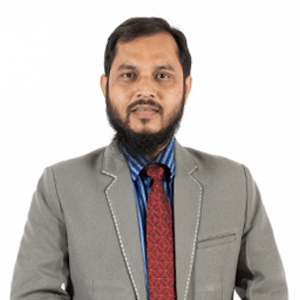
Md. Rabiul Alam
Section Officer
MBS, National University
BBS (Hons), National University
View DetailsContact and Location
Visit Us : Holding 77, Beribadh Road, Turag, Uttara, Dhaka 1230, Bangladesh
Mobile : 01872607360-69
E-mail : info@uttarauniversity.edu.bd
Loading...
